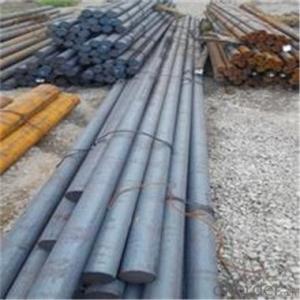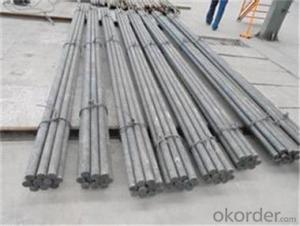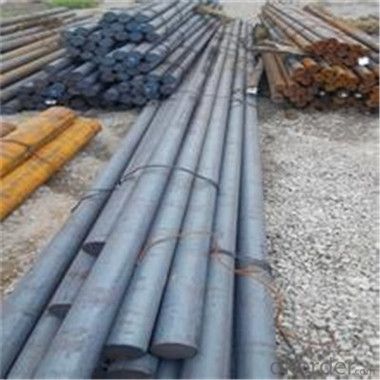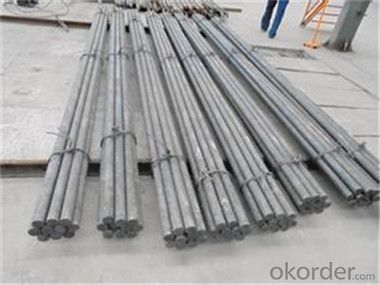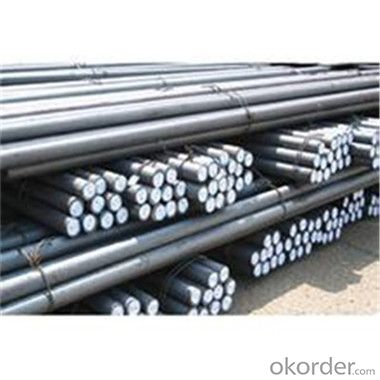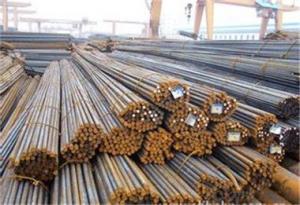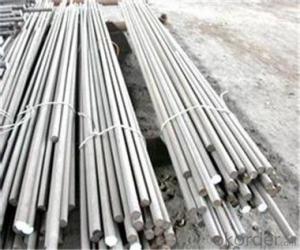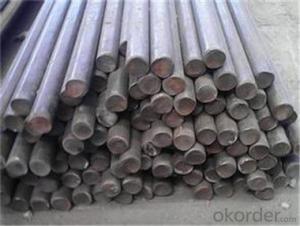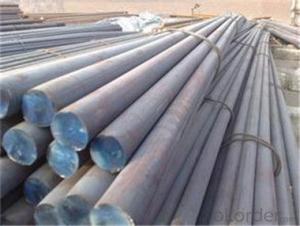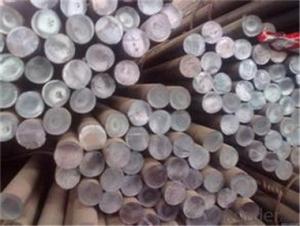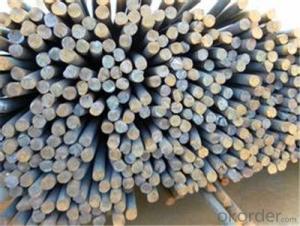Round Bar Manufacturer with Standard High Quality
- Loading Port:
- Tianjin
- Payment Terms:
- TT OR LC
- Min Order Qty:
- 443 m.t.
- Supply Capability:
- 2000000 m.t./month
OKorder Service Pledge
OKorder Financial Service
You Might Also Like
Description of steel round bar:
Surface: Bare, polished, grinded,varnished
Festures of steel round bar:
Mainly used for engineering component, forging industries, foundation bolt, shafting etc
We also stock RINL make rounds from 16mm to 80mm in all the available grades
We also take special orders in EN8, EN9 or any other equivalent grade with specific dimensional requirementsThe data given above in chart are indicative. Actual results may vary.
Specifications of steel round bar:
Description | steel round bar | |
Material | ASTM /AISI | 0,1065,1070,1080,1084 |
DIN | 5,1.7220,1.7218,1.7016,1.6523 | |
Standard | ,A575,BS970,DIN1652,JIS G4051 | |
cross section | Round Other shape:square | |
Surface | Black, galvanized,grinded,varnished,bare | |
Specifications | Round bar | Diameter: 12mm~650mm |
Angle bar | Size: 3mm*20mm*20mm | |
Square/ bar | Size: 4mm*4mm | |
Flat bar | Thickness: 2mm~100mm | |
Width:10mm~500mm | ||
Hexagonal | Size: 4mm~800mm | |
Length | Standard 6m,9m,12m or as required. | |
Trade terms | Payment terms | T/T,L/C,Western Union,negotiable etc. |
Price terms | FOB,CIF,CFR,EXW etc. | |
Applications | agricultural implements, transportation equipment, ornamental workframe work, braces, supports, shafts,axels,etc. Hot rolled Steel round bars have a slightly grain textured finish. | |
Images of steel round bar:
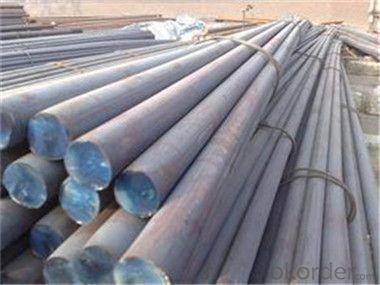
FAQ:
1. What is your package?
Packing situation: standard seaworthy packing or as customer required.
2. How long is the lead time?
Delivery time: 45 days after order confirmed.
3. What payment term do you accept?
Payment: T/T or L/C at sight.
- Q: Can steel round bars be used for pump shaft applications?
- Yes, steel round bars can be used for pump shaft applications. Steel round bars are often chosen for pump shafts due to their high strength, durability, and resistance to corrosion. Additionally, steel round bars can be easily machined and provide excellent surface finish, making them suitable for various pump shaft applications.
- Q: What is the difference between a hot-finished and a cold-finished steel round bar?
- The main difference between a hot-finished and a cold-finished steel round bar lies in the manufacturing process and the resulting physical properties of the steel. Hot-finished steel round bars are produced by passing the steel through a high-temperature furnace, followed by a series of rolling processes. This process helps to shape the steel into its desired final dimensions. The high temperatures during the manufacturing process allow for the steel to be more malleable, making it easier to shape and form. As a result, hot-finished steel round bars often have a rougher surface finish and may have slight imperfections such as scaling and decarburization. However, the high-temperature process imparts improved mechanical properties to the steel, such as higher tensile strength and yield strength, making it suitable for applications that require higher strength and durability. On the other hand, cold-finished steel round bars undergo a different manufacturing process. Cold-finished bars are formed by passing the steel through a series of cold rolling processes, which typically occur at room temperature. This process results in a smoother surface finish and tighter dimensional tolerances compared to hot-finished bars. The absence of high temperatures during the manufacturing process prevents scaling and decarburization, resulting in a more uniform and clean appearance. While cold-finished bars may have slightly lower tensile strength and yield strength compared to hot-finished bars, they offer improved dimensional accuracy and a smoother surface, making them suitable for applications that require precision machining or aesthetic appeal. In summary, the main differences between hot-finished and cold-finished steel round bars lie in the manufacturing process, surface finish, dimensional accuracy, and mechanical properties. Hot-finished bars offer higher strength and are suitable for applications that prioritize durability, while cold-finished bars provide better surface finish and dimensional accuracy, making them ideal for precision machining or applications where aesthetics are important.
- Q: What is the difference between a solid and a hollow steel round bar?
- A solid steel round bar is a cylindrical bar made entirely of solid steel material, meaning it is filled and does not have any hollow spaces inside. On the other hand, a hollow steel round bar is also cylindrical in shape but has a hollow center, meaning it has empty space or a void inside the bar. The main difference between a solid and a hollow steel round bar lies in their structural composition and the purposes they serve. A solid steel round bar is typically used in applications where strength and durability are of utmost importance. It is commonly used in construction, manufacturing, and engineering projects where load-bearing capacity is required. On the other hand, a hollow steel round bar is designed to be lighter in weight while still maintaining structural integrity. The hollow center allows for weight reduction while still providing sufficient strength for various applications. Hollow steel round bars are often used in industries such as aerospace, automotive, and marine, where weight reduction is critical for improved fuel efficiency and overall performance. Additionally, the hollow space inside a hollow steel round bar also provides an opportunity for customization. It can be used to house other components, such as wires or piping, allowing for a more streamlined and efficient design. This makes hollow steel round bars versatile and suitable for various applications that require both strength and weight reduction. In summary, the main difference between a solid and a hollow steel round bar lies in their structural composition and the purposes they serve. Solid steel round bars are used for applications that require maximum strength and durability, while hollow steel round bars offer weight reduction and customization options, making them suitable for applications that prioritize lightweight design without compromising structural integrity.
- Q: Are steel round bars suitable for aerospace applications?
- Yes, steel round bars can be suitable for aerospace applications. Steel is known for its high strength, durability, and resistance to corrosion, which are important factors in the aerospace industry. Steel round bars can be used in various aerospace components and structures such as landing gear, engine components, and structural supports. However, it is important to note that the specific grade and composition of the steel round bars must meet the stringent requirements and standards set by the aerospace industry. Additionally, other factors such as weight reduction efforts and the use of advanced materials like titanium and composites are also considered in aerospace applications.
- Q: What is the difference between a bright and a hot rolled steel round bar?
- The manufacturing processes and resulting characteristics distinguish a bright steel round bar from a hot rolled steel round bar. To produce a hot rolled steel round bar, the steel billet or ingot is heated to a high temperature and then rolled through a series of rolling mills to achieve the desired shape. As a result, the bar has a rough surface texture with a scale layer on the outside. These bars are commonly used in structural applications where strength and durability are crucial. They have a rough appearance and may require additional processing, such as grinding or machining, to achieve a smooth surface finish. In contrast, a bright steel round bar, also known as a cold drawn or cold finished bar, is created by drawing the hot rolled steel bar through a series of dies at room temperature. This process enhances the dimensional accuracy, surface finish, and mechanical properties of the steel. The resulting bright steel bar has a smooth and shiny surface, devoid of scale or rough texture. These bars are frequently used in applications that require an excellent surface finish and tight dimensional tolerances, such as the production of precision components or for decorative purposes. In conclusion, the primary distinction between a bright and a hot rolled steel round bar lies in their surface finish, dimensional accuracy, and applications. Hot rolled steel bars feature a rough surface texture and are suitable for structural applications, while bright steel bars have a smooth and shiny surface finish, making them ideal for precision or decorative applications.
- Q: Can steel round bars be used for making axles?
- Yes, steel round bars can be used for making axles. Steel round bars are commonly used in the manufacturing of axles due to their high strength and durability. The round shape of the bar provides structural integrity and allows for smooth rotation, making it suitable for axle applications. Additionally, steel has excellent mechanical properties, such as high tensile strength and impact resistance, which are crucial for axles to withstand heavy loads and harsh operating conditions. Overall, steel round bars are a reliable and commonly used material for making axles in various industries, including automotive, transportation, and heavy machinery.
- Q: Can steel round bars be heat treated after machining?
- Yes, steel round bars can be heat treated after machining. Heat treatment is a process used to alter the physical and mechanical properties of a material, including steel, by subjecting it to controlled heating and cooling. Machining is the process of shaping or removing material from a workpiece using various tools and techniques. Heat treatment can be performed on steel round bars after machining to improve their mechanical properties, such as hardness, strength, and toughness. The specific heat treatment process used will depend on the desired properties and the specific type of steel being used. Common heat treatment methods for steel include annealing, tempering, quenching, and normalizing. It is important to note that the machining process may introduce stresses into the steel round bar, which can affect the effectiveness of the heat treatment. Therefore, it is essential to carefully consider the machining and heat treatment sequence to ensure optimal results. Additionally, proper precautions should be taken during machining to minimize the introduction of excessive heat or damage to the material, as this can impact the effectiveness of heat treatment.
- Q: What are the advantages of using chromium-alloy steel round bars?
- There are several advantages to using chromium-alloy steel round bars. Firstly, chromium-alloy steel round bars have excellent corrosion resistance properties. The addition of chromium to the steel increases its ability to withstand corrosion and oxidation, making it suitable for use in harsh environments or applications where exposure to moisture or chemicals is a concern. This corrosion resistance helps to prolong the lifespan of the round bars, reducing maintenance and replacement costs. Secondly, chromium-alloy steel round bars offer high strength and durability. The alloying of chromium with steel enhances its mechanical properties, such as tensile strength, hardness, and toughness. This makes chromium-alloy steel round bars ideal for applications that require high strength and resistance to wear and tear, such as construction, heavy machinery, and automotive industries. Another advantage of using chromium-alloy steel round bars is their heat resistance. The addition of chromium improves the heat resistance of the steel, allowing it to maintain its strength and structural integrity even at elevated temperatures. This makes it suitable for use in high-temperature applications, such as furnace components, boilers, and heat exchangers. Furthermore, chromium-alloy steel round bars are known for their excellent machinability. The alloying elements in the steel enhance its ability to be easily machined, allowing for precise shaping and finishing. This makes it easier and more cost-effective to manufacture complex components or parts using chromium-alloy steel round bars. Lastly, chromium-alloy steel round bars are readily available in the market. Due to their popularity and wide range of applications, chromium-alloy steel round bars can be easily sourced from various suppliers. This availability ensures a consistent supply of the material, reducing production downtime and lead times. Overall, the advantages of using chromium-alloy steel round bars include corrosion resistance, high strength and durability, heat resistance, excellent machinability, and availability. These properties make chromium-alloy steel round bars a versatile and reliable choice for a wide range of applications in various industries.
- Q: Can steel round bars be used for making valves or fittings?
- Yes, steel round bars can be used for making valves or fittings. Steel round bars offer excellent strength, durability, and corrosion resistance, making them suitable for various applications in the manufacturing of valves and fittings. They can be easily machined, welded, and fabricated to meet specific design requirements, ensuring reliable and long-lasting performance in valve and fitting systems.
- Q: Can steel round bars be used in manufacturing equipment?
- Steel round bars find extensive usage in the manufacturing industry, owing to their diverse advantageous properties. Renowned for their exceptional strength, durability, and resistance to wear and tear, these bars prove to be an ideal choice for heavy-duty machinery and equipment. They play a crucial role in the production of vital components such as shafts, axles, pins, and gears, which are indispensable for the smooth operation of machinery. Moreover, steel round bars possess the ability to be effortlessly machined, welded, and molded into various shapes, thus showcasing their versatility in different manufacturing applications. Consequently, steel round bars emerge as a dependable and extensively utilized material in the manufacturing industry for equipment construction.
Send your message to us
Round Bar Manufacturer with Standard High Quality
- Loading Port:
- Tianjin
- Payment Terms:
- TT OR LC
- Min Order Qty:
- 443 m.t.
- Supply Capability:
- 2000000 m.t./month
OKorder Service Pledge
OKorder Financial Service
Similar products
Hot products
Hot Searches
Related keywords
